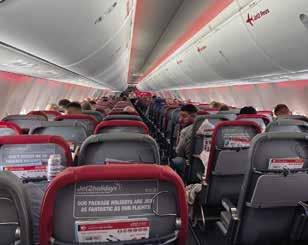
4 minute read
Travel
Travelling post covid – what to expect
In my last article I delved into the dark abyss that is the UK government’s travel traffic light system, and looked at the ever-changing regulations that can apply to your holiday. There is no doubt that it is a bit of a minefield when trying to navigate, and even with professional advice, the reality can perhaps be a bit of an unknown.
Advertisement
I thought that this month it would be helpful if I shared some real-life travelling experiences during the post-COVID era, so that you can fully understand the reality of going on that wellearned holiday.
For my wife’s birthday we had originally been booked to Dubai, however a combination of the dreaded red list, and her falling pregnant, meant that we needed to consider an altogether more sedate holiday, and the hedonistic beach clubs of the Middle East were perhaps a bridge too far.
For context I am double vaccinated, and my wife is not (or wasn’t at the time of travel), so we get to look at the experience here from both angles. We chose Funchal in Madeira as our destination, and while garnering a bit of a reputation as a destination for travellers of a certain, well, vintage, we thought this was most undeserved. Yes it’s quieter than the likes of Tenerife, Majorca or somewhere similar, but it had an air of elegance about it, with the sprawling marina set against the backdrop of the aged old town and the green hills. Most pleasant!


Before we travelled, we had to download the app for Madeira which was simple enough. I uploaded a photo of my COVID certificate which was verified in about 2 hours. As my wife wasn’t vaccinated, we needed to do a pre departure PCR test, which we chose to do at Edinburgh Airport. We also had to prove that we had booked our “day 2 test” for our return. Which at the time of writing is in review – so this may not be relevant.
That process was simple – we were the only car there at the time, and were waved through, test done, and out in a matter of minutes. Back to

The next day we went to the airport. The queue was quick to go down, and we had our documents checked before we approached the desk. We were handed some information about Covid processes in Madeira, however these were the same as the UK, so nothing to worry about.
The flight itself was quite busy, but they did ensure nobody queued in the aisles for the bathrooms etc, so all in all was stress-free. Obviously masks had to be worn, except from when eating/drinking (which I think is a great way of increasing their bar sales… hats off!)
On arrival, our passports were checked, our app was checked and we were at baggage claim within 15 minutes of the aircraft arriving at the gate. Very efficient. While there, we were required to wear a mask whenever moving around the hotel, or inside a restaurant, but given that it was 26 degrees, most of our time was spent by the pool, or on a terrace.
Coming home was just as easy. Most hotels offer an antigen testing service which costs about 30 euros. We chose to go to a local clinic just to see what it would be like for any guests whose hotel didn’t have this service. We were texted a time of 08:00 and 08:02 (very specific) 2 days before we departed. Results were back in 4 hours, and we were able to complete our return form. This took approximately 3 minutes on the government website.

Arriving back into the UK was again nice and efficient. The PLF form is attached to your passport so there is no need even to show it. Simply scan your passport at the e-gates and you’re through in a jiffy.
Off home to complete our day 2 test – which is basically just the same as doing a lateral flow, and dropped it in the local post box. Negative again. Huzzah!
The additional cost of all of these tests comes in at about £160 (£80 if you’re double jabbed) so is significant enough if you’re a larger family for instance. But for the sheer luxury of being able to relax in the sunshine, it was worth every penny in my opinion.
Going forward I can see things start to loosen up even further, so the costs of these extra measures should hopefully continue to decrease.









